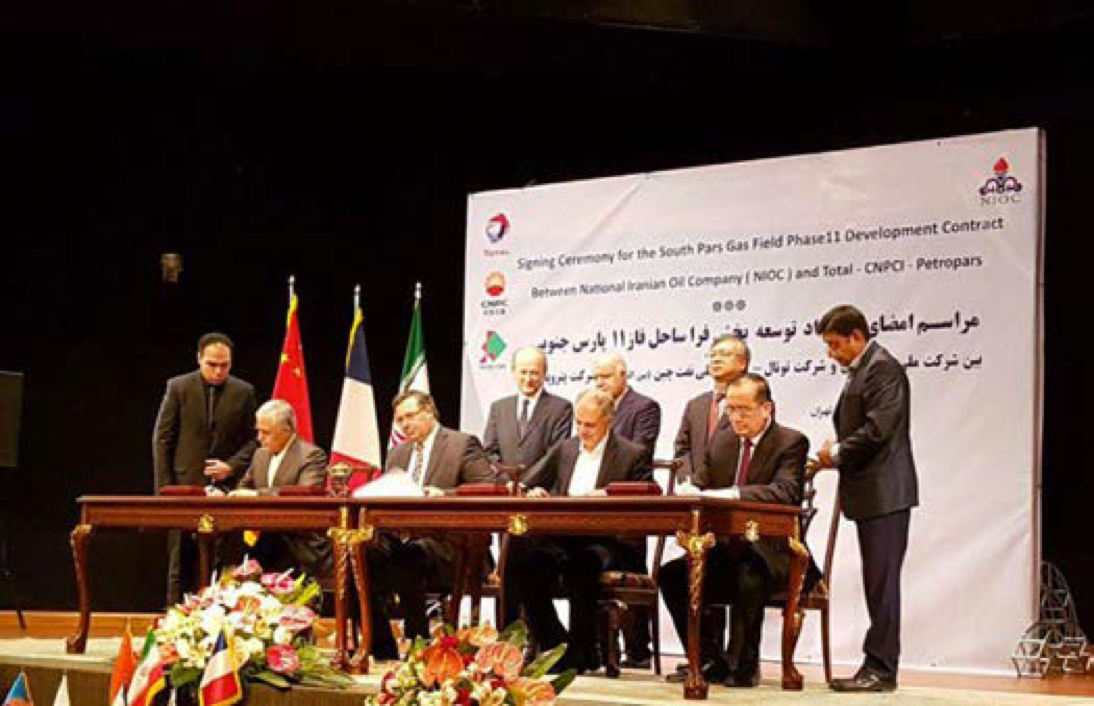[NGW Magazine] Total Spells Bonanza for Iranian Business
This article is featured in NGW Magazine Volume 2, Issue 18
By Dalga Khatinoglu
Iran's foreign content rules spell good news for its engineering sector, with Total's plans for South Pars phase 11 entailing billions of dollars to be spent on local materials and expertise
The French energy major Total has presented officials from Iran’s oil ministry and local companies with details of four tenders it has issued to select subcontractors for the South Pars 11 project.
It won the right to develop and produce gas for 20 years in July, when it received a 50.1% stake. Total’s partners are Chinese CNPC with 30% and local Petro Pars with 19.9%.
Total told NGW that since the November 2016 heads of agreement, Total has been conducting engineering studies on behalf of the consortium and initiated calls for tender in order to award the contracts required to develop the project by the end of the year.
The first phase will cost $2bn and be operational in 40 months.
Recently, Total issued four tender packages on the project, covering building and installing the jackets and topsides, construction of the subsea pipelines as well as platform transportation and installation.
An oil ministry source told NGW that so far, the only local companies to have bid for tenders are Iranian Offshore Engineering and Construction Company (IOEC), Saffgroup – both of which have confirmed their involvement to NGW – and Iran Shipbuilding & Offshore Industries Complex (Isoico). Six other companies including three Chinese and Italian Saipem are among competitors.
Commenting to NGW, IOEC and Saffgroup confirmed their bid. All of the mentioned local bidders have had experience in developing the other phases of South Pars.
But the question is how much the Iranian subcontractors will be involved in the project, regarding Iran’s precondition that local companies should provide at least half the materials, services and equipment for the project. It is intended to produce 56mn m³/d (20.5bn m³/yr) of sour gas and 80,000 b/d of condensate.
Iranian capacity
Local companies could account for well over half on average, on the basis of their know-how, the secretary of the Society of Iranian Petroleum Industry Equipment Manufacturers (SIPIEM), Saeed Ahangaran, told NGW. He said that Iranian manufacturers could provide 70% of downstream projects, but they may have 30% capacity to participate in upstream sector. “If European modern technology is transferred to Iran, local companies can have 50% in upstream projects based on supplying equipment. He added that the local manufacturers can participate mostly in piping or drilling operations, including making on/offshore rigs.
Regarding the feasibility of transferring European technology, he said that the negotiations with French, Italian, German, Norwegian and Dutch companies have already started on wellhead and completion equipment, corrosion-resistant alloy (CRA) pipelines production, other types of special pipelines, high pressure pumps, gas compressors, intelligent pigs, drilling bits, gas turbines and control valves.
Recently, Iran signed a $630-mn agreement with Spanish Tubacex to produce CRA pipelines jointly in Iran.
Ahangaran said that the prospects were very good for local manufacturers to take part in oil and gas projects through technology transfers and investments based on a long-term co-operation with western partners.
However, Homayoun Falakshahi, senior Iran analyst at Wood Mackenzie told NGW that it is not at all a surprise to see IOEC, SAFF and ISOICO involved in SP11 tenders related to construction and installation of platforms, jackets, topsides and pipes. “These companies, along with SADRA and SADAF, are the main EPC contractors in Iran’s offshore sector, and have been active in virtually all South Pars phases. Their role in the development of South Pars became prominent as foreign contractors left Iran following the imposition of new sanctions in 2010 and 2012. As a result they enjoy extensive experience in engineering, constructing and installing huge pieces of offshore equipment. However, their capabilities will be limited for the project’s second phase. The construction of 20,000 tons compressor platforms is not among their abilities yet”.
The second phase of SP11 with worth $2.8 is aimed to launching a 20,000-ton platform with huge compressors by 2023 to maintain the production, when the pressure of field falls.
Although the South Pars 11 contract requires at least 51% of the services (estimated at $5 billion) to be provided by local firms, Minister Zanganeh expressed hope that this level could actually reach more than 70% for this project. Total, as the consortium leader, is incentivized to use as much local content as possible. For the first time, a clause giving the advantage to Iranian firms has been added in the contract: if an Iranian firm’s bid is 10% more expensive than a non-Iranian firm, it has the priority in winning the tender. This is particularly important for the ministry as it allows more local job creation.
One member of the team that worked on the newly-revised oil and gas contract model, Fereydoun Barkeshli, also told NGW that there several Iranian oil, gas and petrochemical service and manufacturing companies have been able to maintain relatively high level of standards, able to compete with international companies abroad. “They are currently active in 17 countries including the central Asian Republics, South America and Africa.”
Barkeshli added: “Nevertheless, I tend to admit that Iranian petroleum service companies suffer from shortage of fund and liquidity that prevents them from competing effectively. The presence of Total and other European companies provide Iranian companies with an ample opportunity to establish access to an already sophisticated market for products such as onshore and offshore pipelines, port equipment and the like.”
According to him, once such a market has opened up for Iranian service companies, they can engage in joint ventures with other overseas companies and upgrade their standards in the short and medium term.



